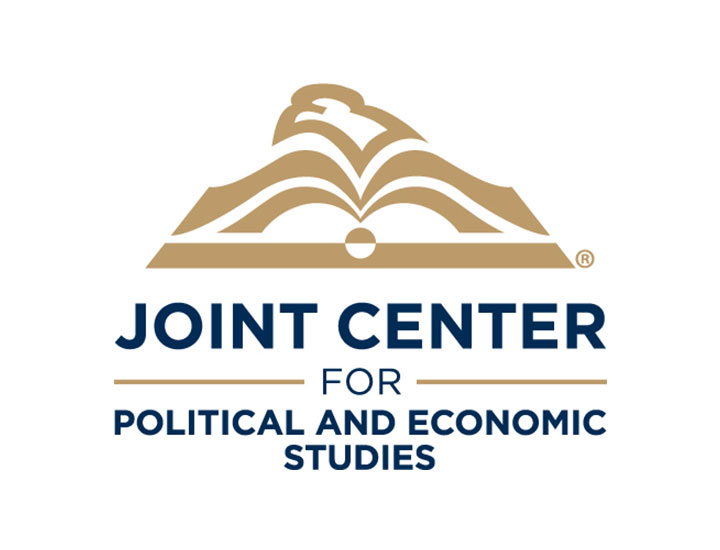
2019 Accomplishments
Joint Center Community:
In 2019, the Joint Center shifted the national debate on the future of work to include racial equity. We also realized historic gains in both U.S. House and Senate top staff diversity. In 2020, we will envision our next 50 years as America’s Black Think Tank.
On economic studies, we:
- Released 3 major reports
- Convened local leaders in Atlanta and Chicago on the future of work and Black communities
- Organized an expert roundtable on data privacy and Black communities
- Hosted expert discussions on Black employment numbers
- Produced outcomes:
- Shifted the national debate on the future of work to include a racial equity lens (including 4 future of work reports and several sessions produced by organizations like McKinsey & Company, National Skills Coalition, The Atlantic, and the U.S. House)
- The U.S. Senate confirmed Commissioner Geoffrey Starks to the FCC (the Joint Center was among the first to recommend that he be nominated in February of 2018)
On political studies, we:
- Released in-depth analysis on diversity data produced by the U.S. House and the U.S. Senate Democratic Caucus
- Raised public awareness on the lack of congressional staff diversity on ABC News, and in The New York Times, USA Today, The Hill, and other national and local outlets
- Honored Black top staffers at two events
- Produced outcomes:
- The passage of a U.S. House rule to establish the Office of Diversity and Inclusion
- The release of the most comprehensive report by the U.S. House on staff race, gender, and compensation
- Diversity of top staff among new House Members that was 45 percent higher than House Members in the prior Congress
- A 57 percent increase over 2018 in the number of Black top Senate staff
- The hiring of the only Black Senate full committee staff director
- The extension of the House Select Committee on the Modernization of Congress, which could play a key role in increasing staff diversity
In 2020, the Joint Center will deepen its future of work, tech/privacy, and Hill diversity initiatives. In addition, we will coordinate groups, activists, and experts to develop Black policy priorities for state and federal transition teams.
The Joint Center will also celebrate its 50th Anniversary in 2020. Throughout the year, we’ll organize several opportunities to honor and learn from the past, and to work with you to envision the next 50 years. Stay tuned!
Details are below, and click here to watch our 4-minute video. Click here for a printable PDF.
Thanks,
The Joint Center Team
Economic Studies
Published Three Major Reports
The Joint Center released three major reports including:
Racial Differences on the Future of Work: A Survey of the American Workforce: The report highlights the findings of what we believe is the most extensive survey on race and the future of work—a survey of perspectives on the changing economy of over 2,000 Black, Latino, white, and Asian Americans. Spencer presented the report’s findings at the 2019 National Urban League Annual Conference.
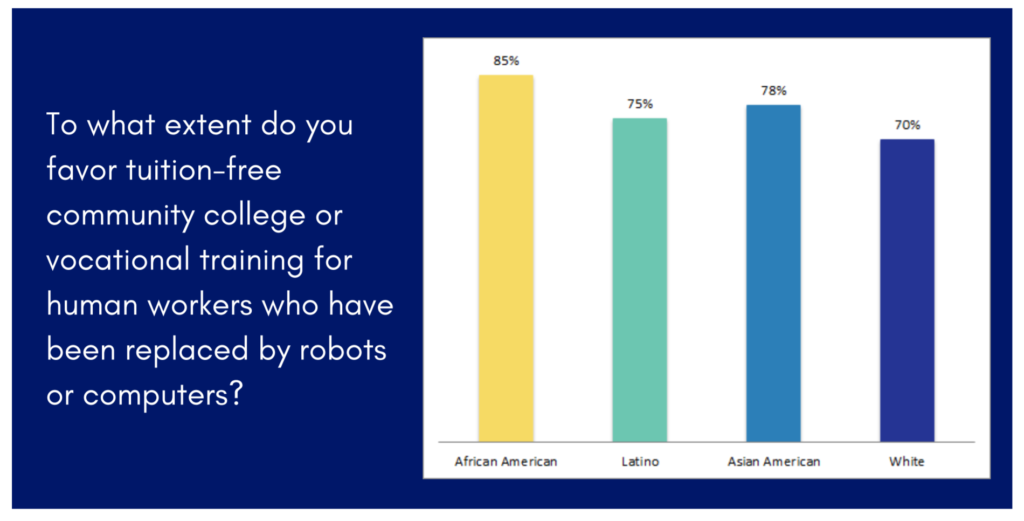
An Introduction to the Future of Work in the Black Rural South: This is the first report in a series, and examines the history, present, and future of work in rural counties with populations that are 35% Black or higher. While often overlooked by policymakers and the media, the Black Rural South is the ancestral home to many African Americans and was shaped by technology (e.g., the cotton gin, assembly lines that fueled the Great Migration, the automation of cotton farming). Uncompensated forced labor in the region allowed the U.S. to displace India and China in cotton production and become a world economic superpower in the 1800s. Today, the region harbors deep racial inequality and poverty. Negative job growth in the region makes the cost of displacement through automation higher than in other areas. In 2020 we’ll release additional research, which will focus on federal, private sector, and local solutions. In September, the Joint Center presented initial findings of this research and obtained feedback from participants at a USDA session at the Congressional Black Caucus Institute’s Mississippi Policy Conference and at the One Voice Mississippi Black Leadership Institute. For a 4-page summary of the research (including graphs), click here.
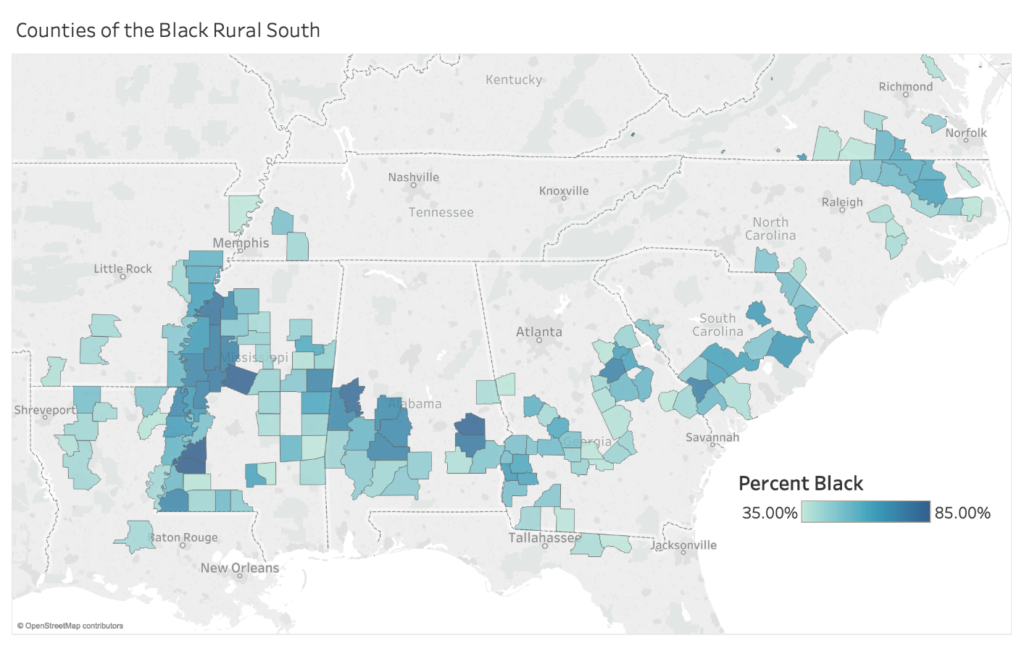
Policies to Help Black & Latino Businesses Use Mobile Apps to Grow: While most Black and Latino businesses have websites, relatively few have customer-facing apps (16 percent of Black businesses and 25 percent of Latino businesses). Americans, however, spend the majority of their online time on smartphones. An incredible opportunity for growth exists, and this report details steps policymakers and others can take to be supportive.
Joint Center President Spencer Overton shared findings from our forthcoming report, Evaluating African American Outcomes to Improve Workforce Training Programs, at a forum hosted by Rep. Lisa Blunt Rochester (D-DE) at the Congressional Black Caucus Foundation’s Annual Legislative Conference (CBC ALC). The forthcoming full report and this 6-page fact sheet call for better data analysis and disclosure of workforce development outcomes by race to ensure that training programs are effective for African Americans.
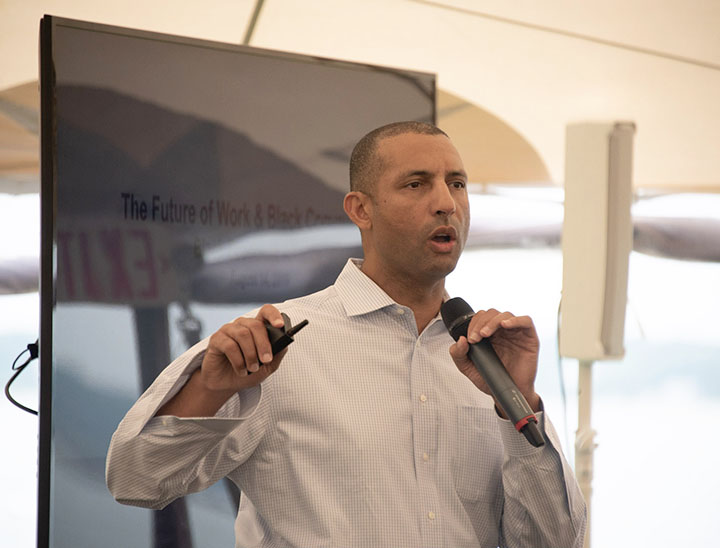
Spencer presents findings from our research on the future of work and the Black Rural South at the Black Economic Forum on Martha’s Vineyard
Public Education on the Future of Work
Spencer wrote an op-ed for The Hill calling for 2020 Democratic presidential candidates to focus on the future of work priorities identified by people of color in Racial Differences on the Future of Work: A Survey of the American Workforce.

The Joint Center partnered with the National Skills Coalition to co-author “An Unequal Future of Work Requires Different Training Strategies for Vulnerable Workers,” an entry in a collection of essays entitled “Taking Action: Positioning Low-Income Workers to Succeed in a Changing Economy.” The publication was funded by the Annie E. Casey Foundation and the Joyce Foundation.
Leading Discussions on the Future of Work & Race
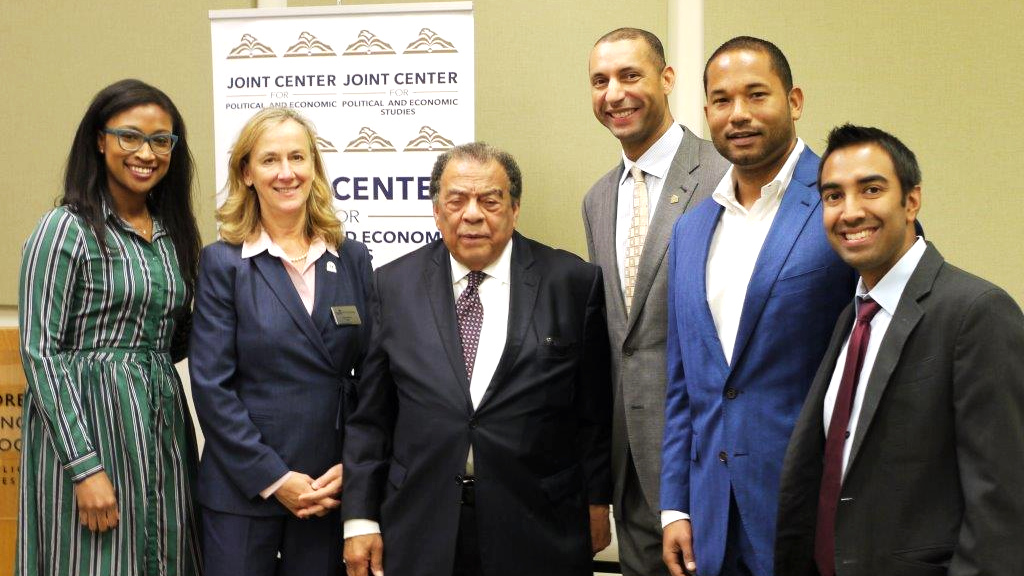
Ambassador Andrew Young Jr. (center) at the Joint Center’s future of work convening in Atlanta
The Joint Center organized:
Future of work convenings in Chicago and Atlanta to discuss the implications of the changing nature of work on African Americans in the respective cities and surrounding areas. The day long workshops, hosted in partnership with Comcast NBCUniversal, brought together practitioners, community leaders, workforce groups, the business community, and college students. We will host two workshops on the future of work for Black communities in Philadelphia and Oakland in 2020.
A roundtable lunch with Waymo Chief External Officer Tekedra Mawakana on autonomous vehicles and communities of color.
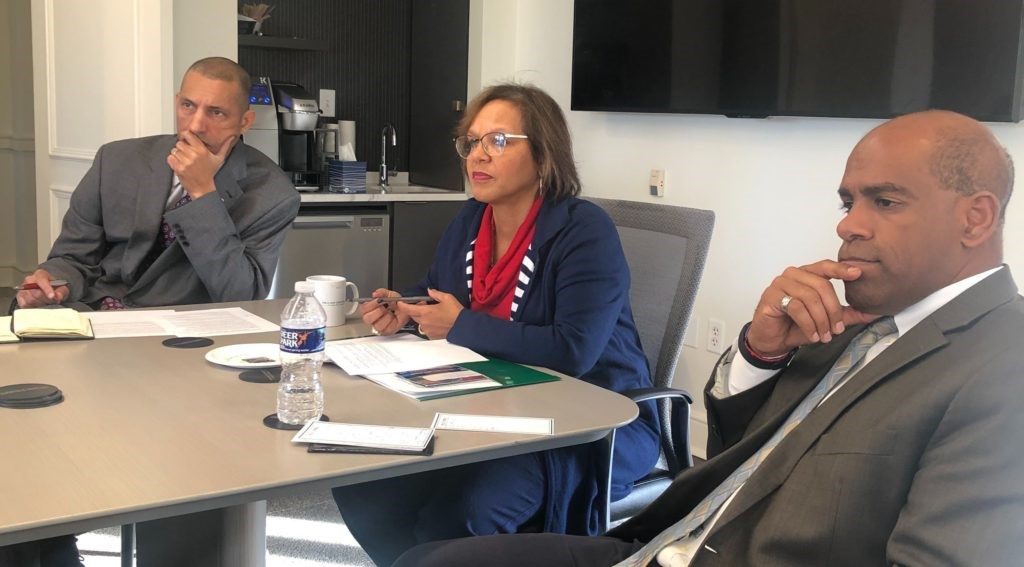
Congresswoman Kelly at the Joint Center’s inaugural breakfast policy forum, A Voice at the Table
A breakfast policy forum, A Voice at the Table, with inaugural speaker Congresswoman Robin Kelly (D-IL 2nd District), who is a member of the House Energy and Commerce Committee.
Shifting the National Debate on the Future of Work to Include a Racial Equity Lens
From the beginning of the Joint Center’s future of work efforts, we have aspired to shift the debate so that mainstream organizations incorporate racial equity in their future of work projects. Several publications advanced this goal in 2019, including McKinsey & Company’s “The Future of Work in America” and “The Future of Work in Black America” reports (the Joint Center provided comments on an early draft of the latter document), National Skills Coalition’s “The Roadmap for Racial Equity: An imperative for workforce development advocates” report, and New America’s “Worker Voices: Technology and the Future for Workers” report. These organizations, along with Politico, The Atlantic, the U.S. House Committee on Education & Labor, and other groups incorporated racial equity into their events on the future of work.
Inserting Diverse Perspectives in Future of Work Discussions
The Joint Center spoke on racial inclusion at leading future of work events organized by AARP, Asian Americans Advancing Justice | AAJC, Aspen Institute (a workshop on agriculture, “Modernizing Policy for a Changing Economy,” and “The Case for Action”), the Black Economic Alliance, Brookings, Center for American Progress, Congressional Black Caucus Foundation, Center Forward, Data For Black Lives, Generocity, McKinsey & Company and the Boulé Foundation, National Association for Community College Entrepreneurship, National Association of Workforce Boards, National Bar Association, National Skills Coalition (“Uneven Prospects for Different Workers” and a discussion on actionable policies to address the changing nature of work), New America, Princeton University’s Students and Alumni of Color, SXSW (“Diversity in Tech and The Future of Black Communities” and “Facing Digitalization: A Workforce at Risk“), The Atlantic, Union of Concerned Scientists, U.S. House of Representatives Committee on Education and Labor Chairman Bobby Scott (D-VA), Verizon, Walmart, and Washington Center for Equitable Growth.
Our research also garnered news coverage in several publications, including:
Bloomberg, Communications of the ACM, Diverse: Issues in Higher Education, EdWeek, GW Hatchet, Inside Higher Ed, Political Hispanic, and #RolandMartinUnfiltered.
AI, Data Privacy, and Tech & Telecom Policy
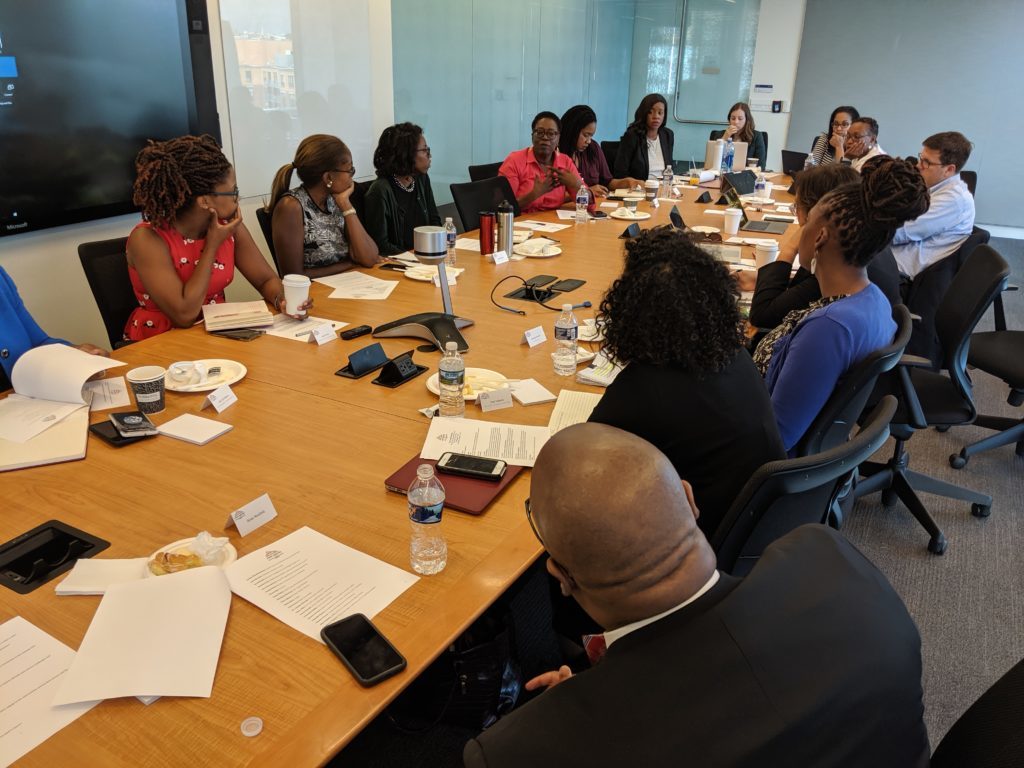
The Joint Center’s data privacy roundtable during CBC week
The Joint Center organized an invite-only roundtable to identify key data privacy concerns unique to the African American community. Attendees discussed challenges and solutions related to data privacy and highlighted research questions open for future inquiry.
With an eye toward issues of particular importance to Black communities, Spencer shared his thoughts on the short book People’s Guide to AI. Spencer is currently writing an article on Section 230 of the Communications Decency Act and social media ad targeting that resulted in voter suppression in Black communities.
Joint Center Economic Policy Director Jessica Fulton and several other data privacy-minded advocates, academics, researchers, political and government officials, practitioners, and lawyers contributed insights on data privacy issues that were synthesized into Understanding Data Privacy Protections Across Industries, a report published in November by Harvard Kennedy School’s Belfer Center for Science and International Affairs’ Technology and Public Purpose Project and New America Foundation’s Public Interest Technology.
Calling on the U.S. House and U.S. Senate to embed civil rights principles in online privacy debate, hearings, and legislation, the Joint Center and several civil rights organizations sent a letter to the Chairs and Ranking Members of the Senate Commerce, Science & Transportation Committee, the House Energy and Commerce Committee, and both the Senate and House Judiciary Committees. Read the letter here.
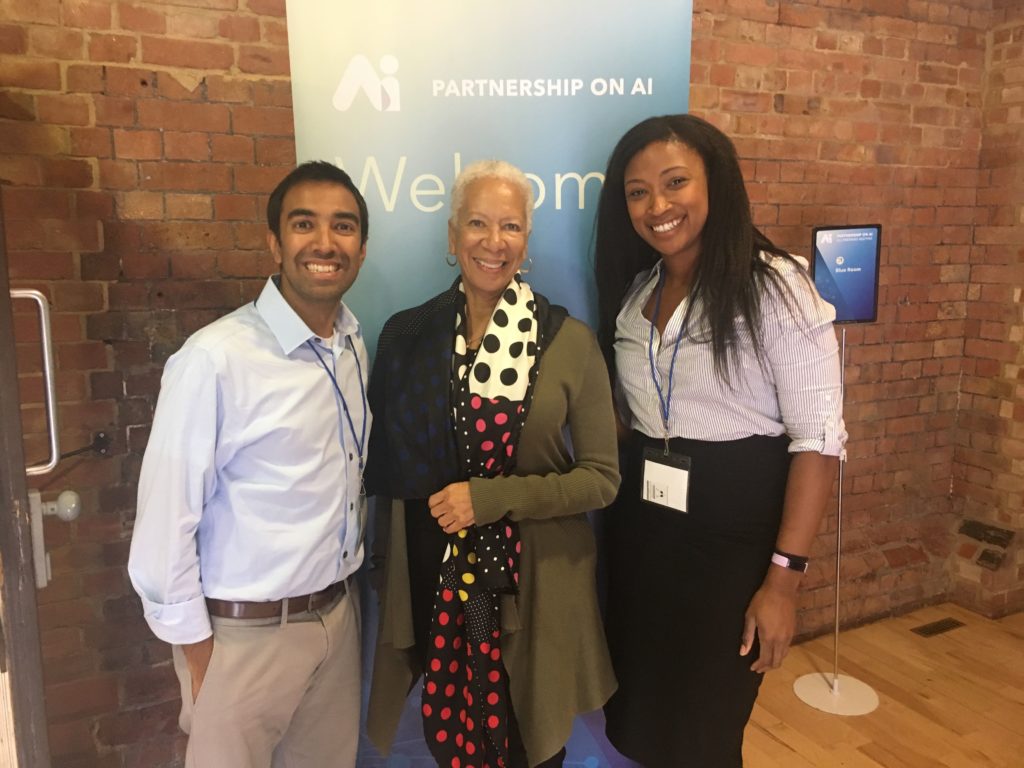
Joint Center’s Former Workforce Policy Director Harin Contractor (left), PolicyLink Founder in Residence Angela Glover Blackwell (center), and Joint Center Economic Policy Director Jessica Fulton (right) at Partnership on AI conference in London
As an active member of the Partnership on AI, the Joint Center participated at the Partnership’s workshops on Positive Futures from AI and AI and Worker Voice, and attended the Partnership’s annual summit in London.
The Joint Center participated in a convening on civil rights and tech organized by Color of Change and other Change The Terms Coalition members, Facebook, the National Telecommunications and Information Administration, and Google’s NextGen Program.
Jessica also attended Google NextGen’s December 2019 summit where she engaged with scholars, civil rights advocates, entrepreneurs, and artists on issues at the intersection of tech policy and social justice.
Engaging the FCC
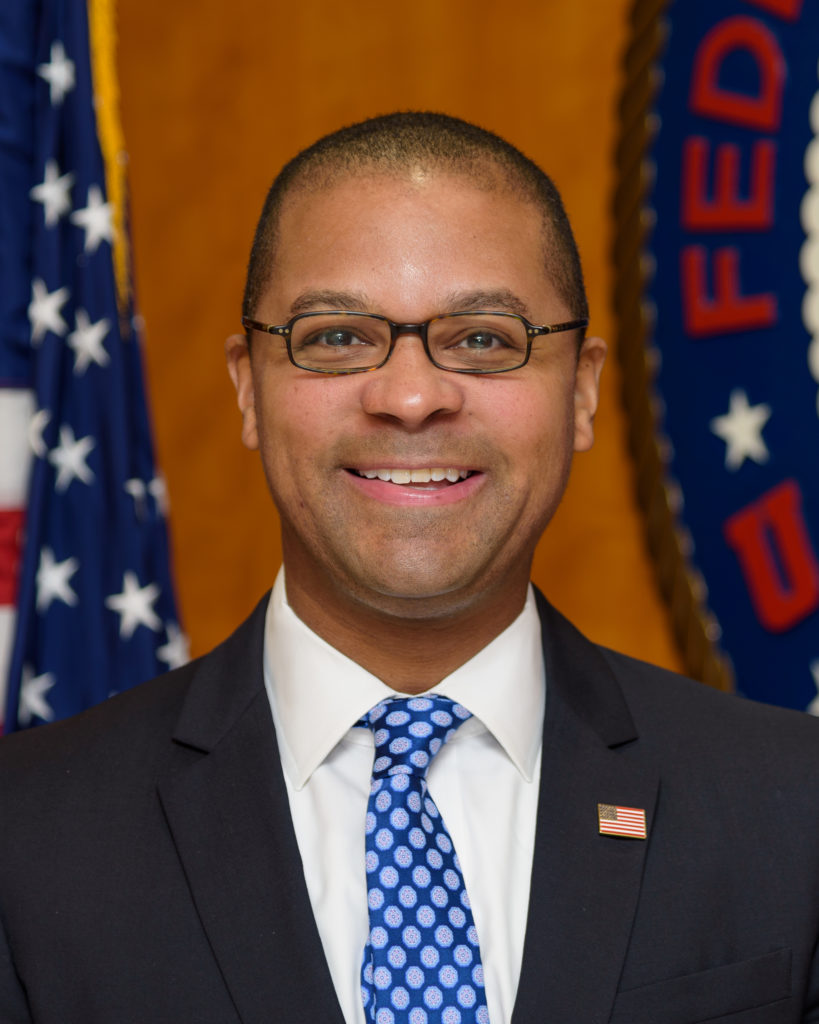
In January, the U.S. Senate confirmed Commissioner Geoffrey Starks to the FCC. The Joint Center was among the first to recommend that he be nominated in February of 2018, and after his nomination the Joint Center pressed for his confirmation.
Commissioner Starks spoke with Joint Center Workforce Policy Director Harin Contractor on connectivity in relation to Black communities.
The Joint Center obtained a position on the FCC’s Advisory Committee on Diversity and Digital Empowerment (ACDDE), and is represented by Harin Contractor.
Economic & Social Policy
Spencer wrote this op-ed on the marginalization of African Americans in public higher education for the National Newspaper Publishers Association (the Black publishers’ organization). The piece was published in several Black newspapers across the U.S.
Jessica appeared on The Hill’s “What America’s Thinking” to discuss the Affordable Care Act (ACA).
The Joint Center partnered with Groundwork Collaborative and the UnidosUS Action Fund to complete an ethnography and survey of nearly 4,000 Black and Latino adults on their views of the economy.
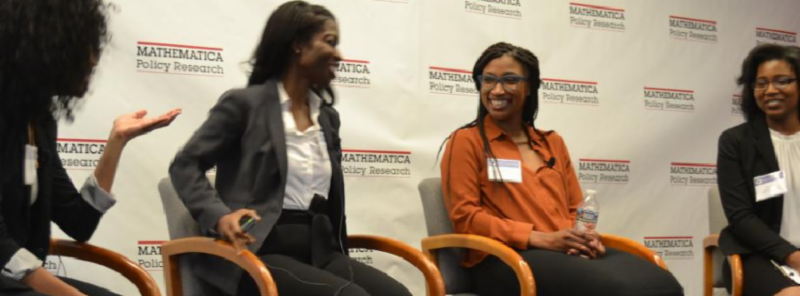
Joint Center Economic Policy Director Jessica Fulton participated in the Sadie T.M. Alexander Conference
The Joint Center moderated or participated as a panelist at the following events:
- The National Academy of Social Insurance’s 31st Annual Policy Conference panel on the “Regenerating Social Insurance for Millennials and the Millennium.”
- Sadie T.M. Alexander Conference’s panel on undergraduate opportunities for hopeful economists.
- New America’s panel “Implications for Social Policy” on the “millennial wealth gap.”
The Joint Center also participated in workshops hosted by AARP on household liquidity, the Economic Policy Institute’s Program on Race, Ethnicity and the Economy on turning good intentions into constructive engagement on race, and the National Women’s Law Center on race, gender, and tax policy.
Key Research on Economic Issues in Black Communities
The Joint Center partnered with Third Way to complete an ethnography and survey of over 1,200 African Americans on their views on voting and economic policy preferences. The results will be released in late 2019.
In 2020, we will release two reports on apps and entrepreneurs of color: 1) An Introduction to Mobile Apps for Black & Latino Businesses; and 2) App Development for Black & Latino Businesses.
Discussing Black Jobs with Black Experts
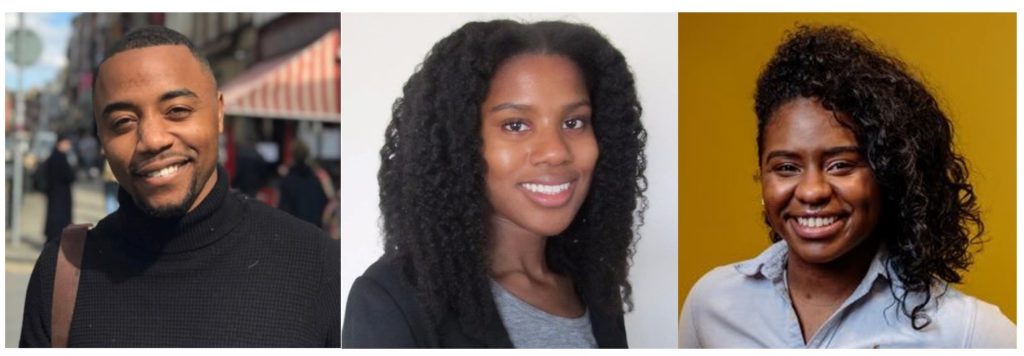 Center for American Progress Research Associate Donovan Hicks, Policy Matters Ohio Researcher Victoria Jackson, and The Education Trust’s Higher Education Policy Analyst Satra Taylor
Center for American Progress Research Associate Donovan Hicks, Policy Matters Ohio Researcher Victoria Jackson, and The Education Trust’s Higher Education Policy Analyst Satra Taylor
Joint Center Workforce Policy Director Harin Contractor hosted expert discussions on Black jobs numbers with notable researchers and analysts:
- Center for American Progress Research Associate Donovan Hicks
- Urban Institute Research Analyst Travis Reginal
- Groundwork Collaborative Deputy Executive Director Angela Hanks, Associate Director for Program and Strategy Sam Sanders, and Policy & Research Director Janelle Jones
- NC Budget & Tax Center Policy Analyst Brian Kennedy
- Dēmos Economist Algernon Austin
- Third Way Social Policy and Politics Fellow Akua Amaning
- Policy Matters Ohio Researcher Victoria Jackson
- Howard University’s Assistant Professor of Economics Jevay Grooms
- Georgia Budget and Policy Institute’s Senior Policy Analyst Alex Camardelle
- CLASP Policy Analyst Parker Gilkesson
- Alabama A&M University Visiting Professor Dr. Kristen E. Broady
- Omidyar Network Senior Manager of Reimagining Capitalism Joelle Gamble
- The Education Trust’s Higher Education Policy Analyst Satra Taylor and Data and Policy Analyst Kayla Patrick
- National Skills Coalition State Policy Director Melissa Johnson
Political Studies
Released In-Depth Analysis on Hill Diversity
Joint Center Diversity & Inclusion Senior Fellow Dr. LaShonda Brenson examined the 2019 Senate Democratic Caucus demographic staff data. The analysis includes a series of lists ranking Senate offices in categories such as top three racially-diverse personal offices, top Senators with Black staff, and Senators up by more than 5 points from 2018 in racial diversity. LaShonda also analyzed the racial diversity of the Senate personal offices of the 7 U.S. Senators running for the 2020 Democratic presidential nomination.

Dr. Brenson’s analysis of racial/ethnic diversity data produced by the survey by the U.S. House of Representatives in 2019
LaShonda also examined the racial/ethnic diversity of personal offices in our initial analysis of the House of Representatives Compensation and Diversity Report, and followed-up with another analysis of committee and leadership offices in the U.S. House. The report is one of the most extensive yet and includes more data on staffers than we’ve seen before, but it is unclear whether the 51 percent of House staff that participated in the survey are representative of both parties.
Tracked Top Staff Hiring of Newly-Elected Members
The Joint Center continued to track new hires by new Members and top staff of color hired by returning Members.
Our May 2019 data showed that people of color accounted for 19.85 percent of top staff hired by newly-elected U.S. House Members (25.84 percent of Democratic top staff and 7.14 percent of Republican top staff). This percentage is higher than the 13.7 percent of diverse top staff in the entire House staff as reported in the Joint Center’s September 2018 study, and 7.7 percent of diverse top staff hired by newly-elected U.S. Senators.
Public Education on Hill Diversity
LaShonda penned an op-ed for The Hill encouraging Congress to better address its lack of staff diversity by collecting and releasing more detailed data.
Joint Center Black Talent Director Don Bell gave guest lectures to National Emerson Hunger fellows at the Congressional Hunger Center (here) and to political science students at Howard University (here).
Our research also garnered news coverage in the ABC News, Boston Globe, Comcast Newsmakers, CNBC, Michigan Advance, The Hill, The New York Times, Refinery29, Roll Call, Tom Joyner Morning Show, USA Today, and other outlets.
Leading Discussions on Hill Diversity
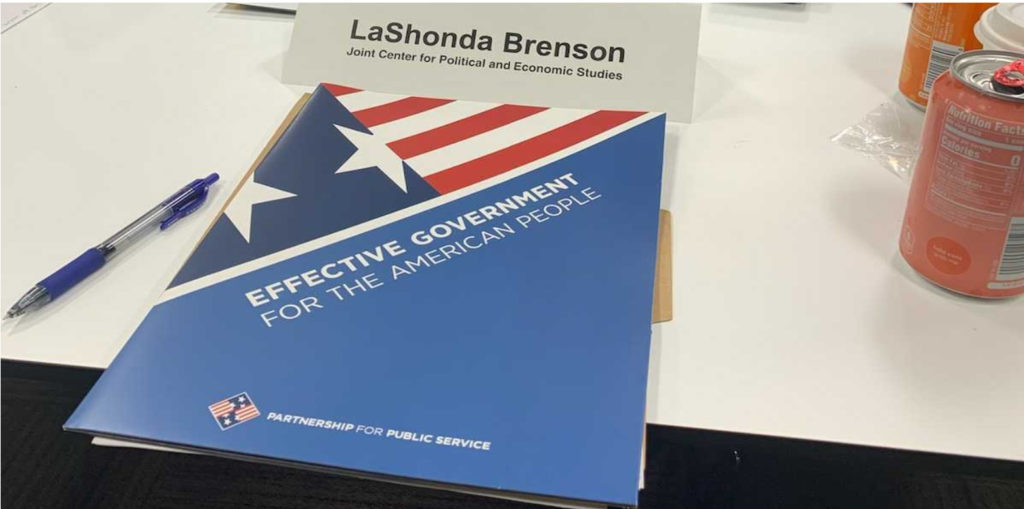
The Joint Center spoke on Hill diversity at events organized by Harvard Law School Black Alumni Association, Partnership for Public Service, and Women in Government Relations.
The Joint Center also joined over 20 organizations urging Speaker Nancy Pelosi, Minority Leader Kevin McCarthy, and Members of the Select Committee on the Modernization of Congress to extend the Select Committee’s mandate for one additional year.
Applauded Progress
The Joint Center hosted a CBC luncheon to discuss the 2019 CBC agenda and to honor Black top staffers.
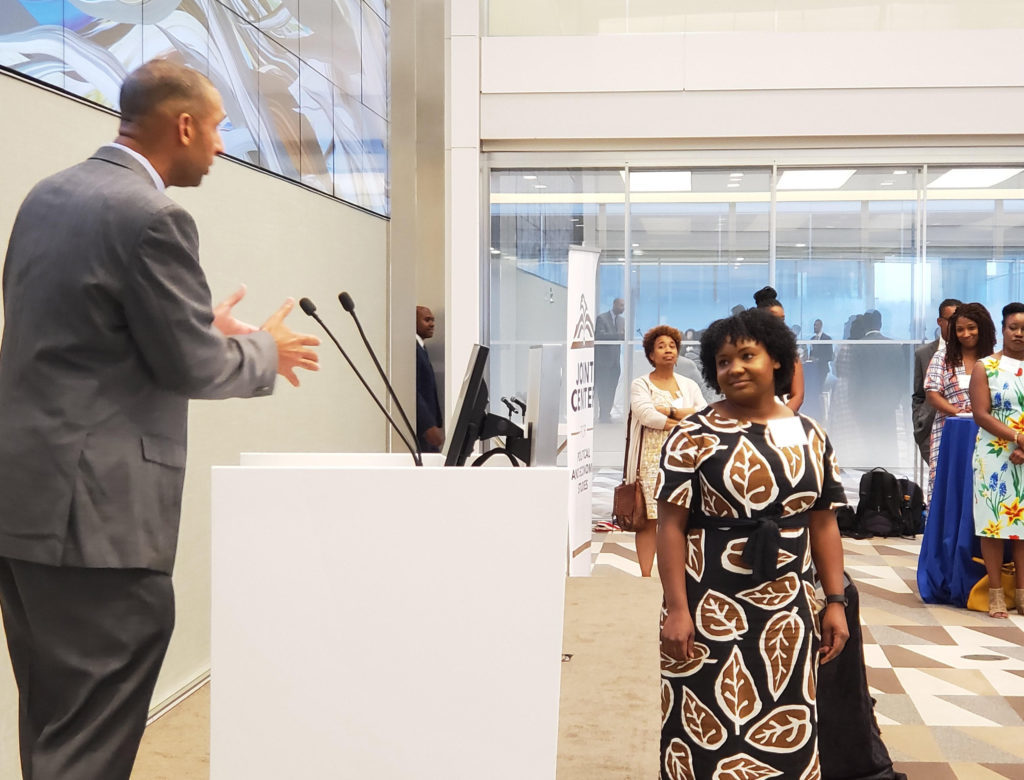
Joint Center President Spencer Overton and Senior Fellow of Diversity & Inclusion Dr. LaShonda Brenson at our reception honoring Black chiefs of staff on the Hill
The Joint Center also co-hosted a reception with the Lawyers’ Committee for Civil Rights Under Law to honor Black chiefs of staff on the Hill during CBCF ALC week. Special thanks to Covington & Burling LLP for providing a venue for the event.
The Joint Center issued press releases acknowledging key progress, including commending Ranking Member of the U.S. Senate Committee on Commerce, Science, and Transportation Senator Maria Cantwell (D-WA) on hiring the first Black full committee staff director in the U.S. Senate in two years, and commending Senators Jeanne Shaheen (D-NH) and Richard “Dick” Durbin (D-IL) for appointing Black legislative directors in their respective personal offices.
LaShonda attended the Senate Black Legislative Caucus’s reception honoring its 42-year history of highlighting diversity and inclusion in the Senate.
Board Member Honored
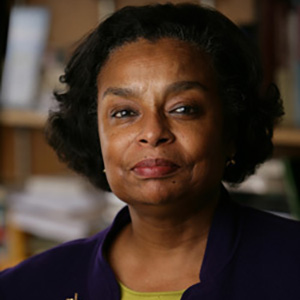
Joint Center Board Member and Notre Dame Presidential Faculty Fellow Dr. Dianne Pinderhughes was elected to the renowned American Academy of Arts and Sciences (AAAS). She now joins other “thinkers and doers” such as Michelle Obama (who was also elected this year), Chimamanda Ngozi Adichie (2016), and Denzel Washington (2010). Learn more about Dr. Pinderhughes here.

Joint Center Board Member and Google Strategic Outreach & Senior Partnerships Counsel Chanelle Hardy was honored at Diverse and Engaged D&I Honors event for her “bold moves in consumer engagement.” We appreciate Chanelle’s leadership and commitment to diversity and inclusion.
Voting and Political Science
In light of significant segregation and gerrymandering of single-member districts known as “wards,” the Joint Center commissioned a “Study of Reform Proposals for Chicago City Council.” The findings of the research supported a transition to multimember wards with rank choice voting to advance holistic diversity and increase responsiveness to constituents.
The Joint Center’s 2015 study, “50 Years of the Voting Rights Act: The State of Race in Politics,” was quoted in The Hill’s article on how the historical Freedom Summer could help returning citizens in Florida and was cited by its co-author, Dr. Khalilah Brown-Dean, in her book, Identity Politics in the United States.

Joint Center Economic Policy Director Jessica Fulton moderates discussion for Brookings Institution
Jessica moderated a conversation on the intersection between civic engagement, tax policy, and public services with Brookings Institution Senior Fellow of Governance Studies Vanessa Williamson on her recent report, “The Filer Voter experiment: How effective is voter registration at tax time?”
LaShonda participated in a roundtable, Thinking Outside the Box: Applied Careers in Political Science, at the American Political Science Association’s annual meeting.
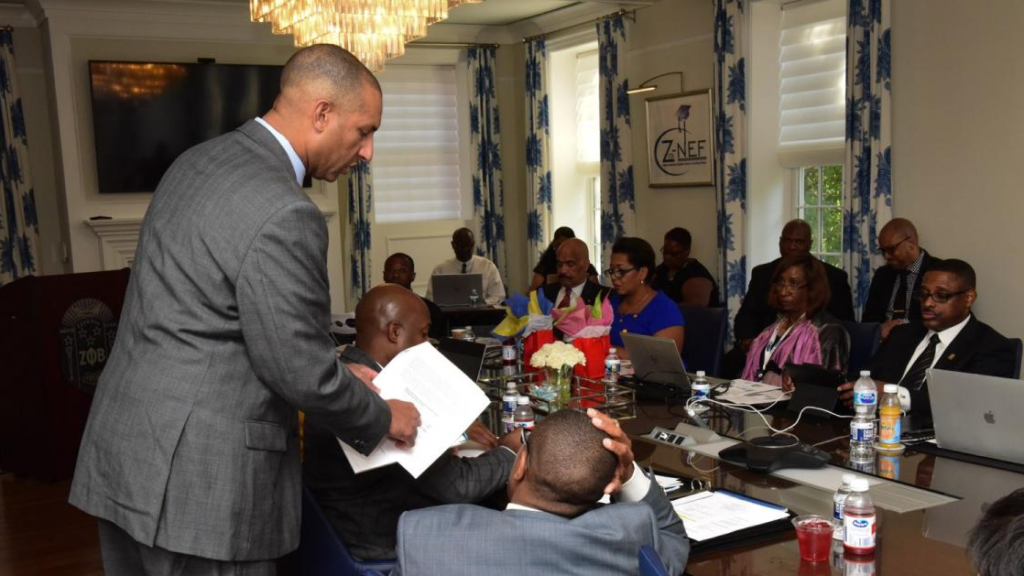
Joint Center President Spencer Overton meets with the Divine 9
Spencer met with the National Pan-Hellenic Council Presidents (the leaders of the nine major Black fraternities and sororities—the “Divine 9”). He talked about issues that are key to the Black community, including the need for research on mobilizing Black voter participation, and the important roles of Black social organizations in facilitating Black migration to areas with high job growth and educating federal officials on policy issues of significance to Black communities.
Jessica appeared on #RolandMartinUnfiltered to discuss the political landscape.
The Joint Center at 50:
Our History and Our Future
In 2020, the Joint Center will celebrate its 50th anniversary. We will honor our legendary past, while looking toward our bright future.
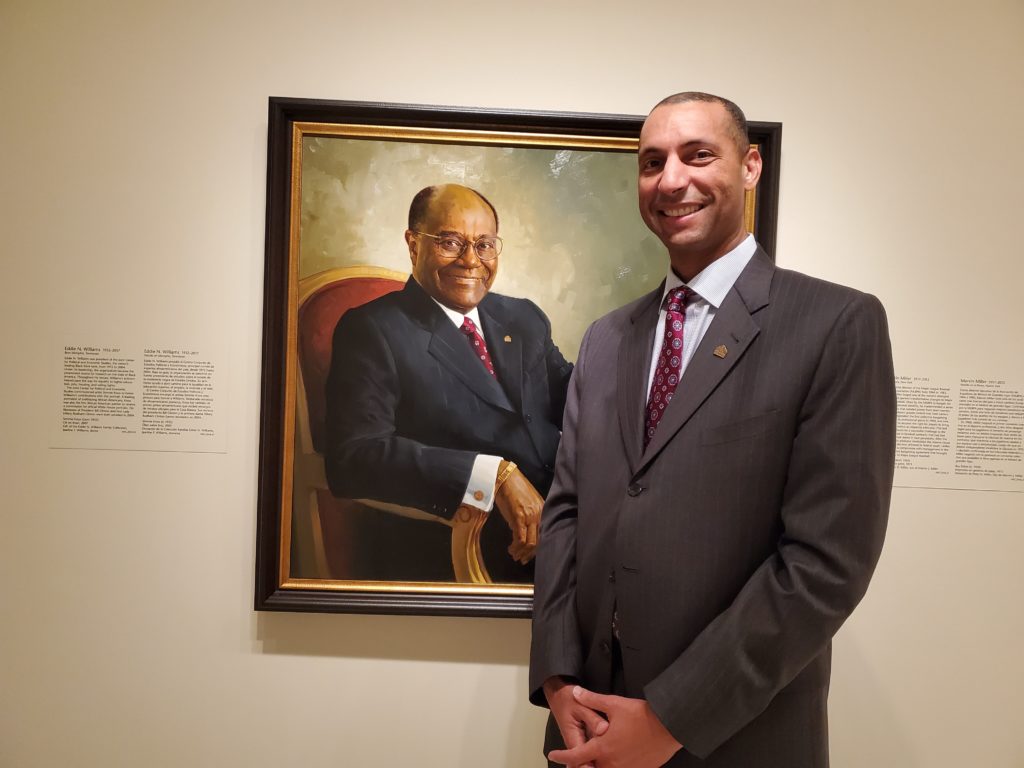
Joint Center President Spencer Overton beside a portrait of former Joint Center President Eddie N. Williams at the Smithsonian Institution’s National Portrait Gallery
The Smithsonian Institution’s National Portrait Gallery unveiled its “Recent Acquisitions” exhibit which includes a portrait of Former Joint Center President Eddie N. Williams. The portrait is being displayed with images of other notable figures such as Wilma Rudolph, Ernest Everett Just, and Samuel Northup. The portraits will remain on the first floor through Aug. 30, 2020 before joining the museum’s permanent collection.
The University of Pennsylvania’s Think Tank and Civil Societies Program named the Joint Center…
- One of the top think tanks in the U.S.: Of the 1871 think tanks in the U.S., the Joint Center ranked No. 54 out of 97 think tanks that “excel in research, analysis, and public engagement on a wide range of policy issues with the aim of advancing debate, facilitating cooperation between relevant actors, maintaining public support and funding, and improving the overall quality of life in the United States.”
- One of the top social policy think tanks: Of the 8,162 think tanks worldwide, the Joint Center ranked No. 50 of 110 think tanks that are “leading social policy institutions” that “provide superior innovative research and strategic analyses on topics pertaining to a wide array of social issues and challenges.”
- One of the think tanks with best quality assurance and integrity policies and procedures: Of the 8,162 think tanks worldwide, the Joint Center ranked No. 62 of 70 think tanks that “adhere and uphold moral and ethical righteousness in their research practices.”
The Joint Center launched a brand new website. Over the past year, we spent time brainstorming a new design to best serve our mission as America’s Black Think Tank.
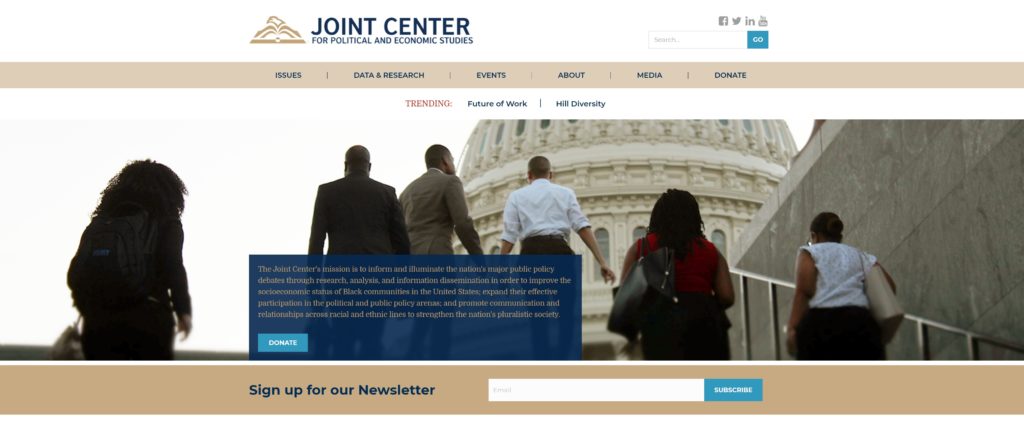
The Joint Center garnered additional news coverage in The New York Times profile on National Association of Black Journalists (NABJ) founder Paul Delaney, who collected signatures for the NABJ’s founding document at a Joint Center event.
New Team Members in 2019
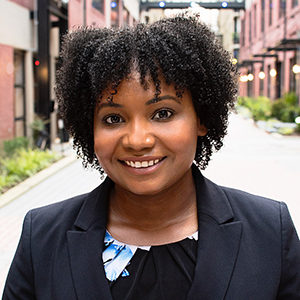
Dr. LaShonda Brenson joined the Joint Center team as our Diversity and Inclusion Senior Fellow to lead our research and solutions on congressional staff diversity. LaShonda earned her Ph.D. in Political Science from the University of Michigan-Ann Arbor and a B.A. in Mathematics and Political Science from the University of Rochester. Her previous roles include Civil Rights Analyst at the U.S. Commission on Civil Rights and Research Director at Project Vote.
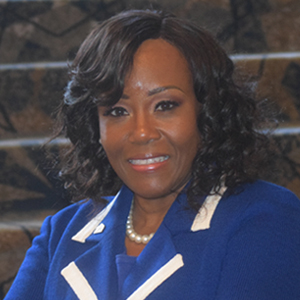
Roslyn Hannibal-Booker joined the Joint Center team as our Development Director. Formerly with the NAACP, Roslyn has over 20 years of fundraising experience. She is a graduate of the University of Baltimore, and she has a certificate in Nonprofit Leadership Management from Duke University. She is a member of Zeta Phi Beta Sorority, Inc and the immediate former Chair of the Zeta International Educational Foundation. Roslyn is a member of Harford County (Maryland) Commission for Women, the National Council of Negro Women, the Association for Fundraising Professionals, and the Washington Government Relations Group.
Major Financial Supporters
Annie E. Casey Foundation, Boulé Foundation, Comcast NBCUniversal, Democracy Fund, Google.org, Hewlett Foundation, Lumina Foundation, and Marguerite Casey Foundation.
Other Supporters Over $5000
AARP, Aflac, American Express, Apple, A. Scott Bolden, Citi, CTIA, ExxonMobil, FedEx, Ford Foundation, Joyce Foundation, JPMorgan Chase, MasterCard, Microsoft, Peterson Foundation, Reed Smith, Rockefeller Brothers Fund, Third Way, UPS, Venable, Verizon, Viacom, and Walmart.
Other Supporters Over $1000
Paula Boyd, Rob Hagans, Chanelle Hardy, Barbara Johnson, Kevin Merida, Spencer Overton, and Paul Thornell.
Board
Thanks to our board, which consists of Barbara Johnson (Chair), A. Scott Bolden, Paula Boyd, Robert Hagans (Treasurer), Chanelle Hardy, Spencer Overton, Dr. Dianne Pinderhughes, Robert Raben (Secretary), Paul Thornell, and Antonio Williams.
Staff
Spencer Overton (President), Dr. LaShonda Brenson (Diversity & Inclusion Senior Fellow), Jessica Fulton (Economic Policy Director), Roslyn Hannibal-Booker (Development Director), Victoria Johnson (Digital Communications Specialist), and Attia Little (Office Manager).

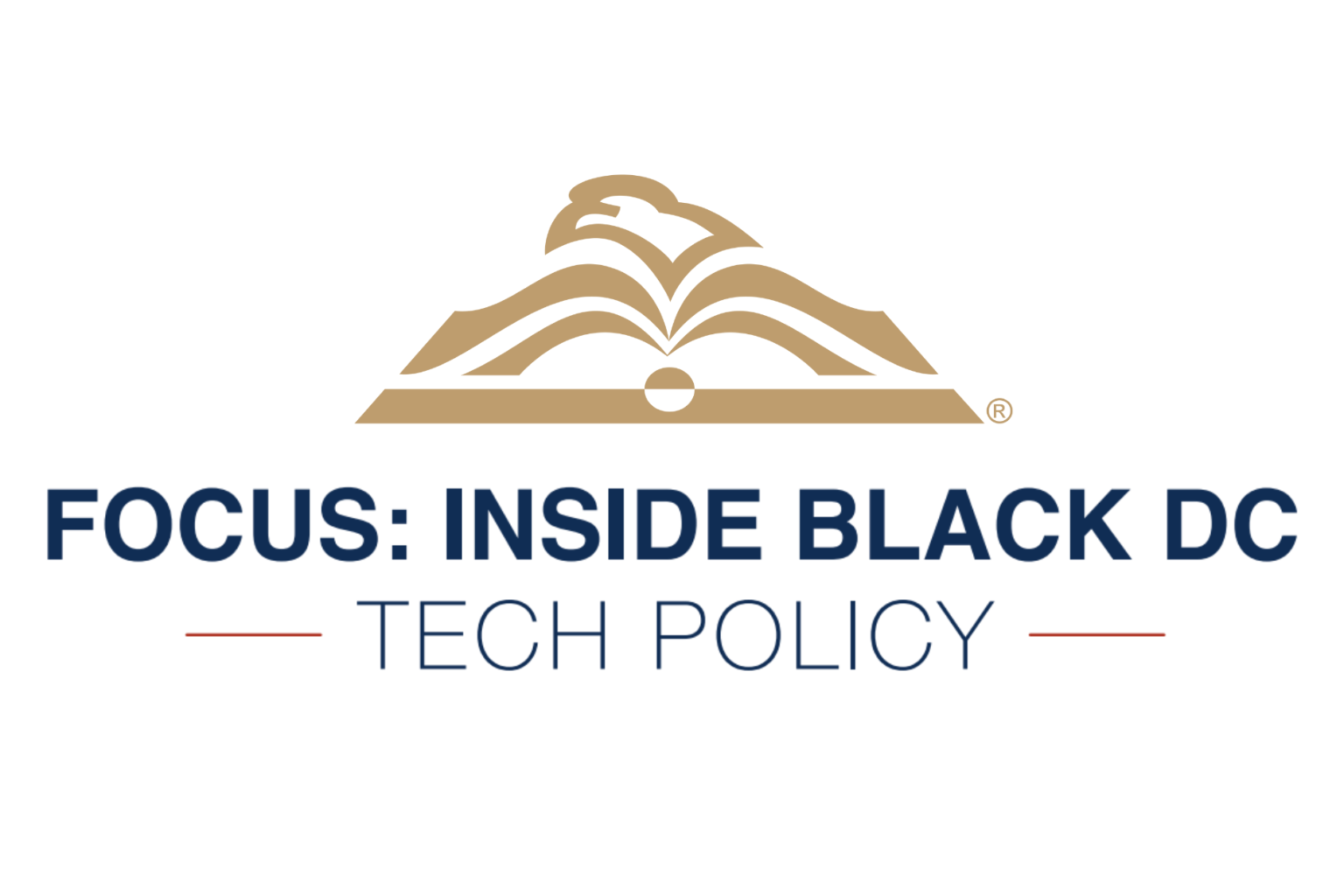


April 2024 Jobs Day Analysis